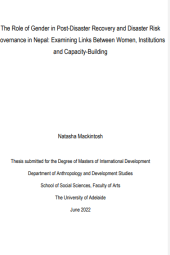The Role of Gender in Post-Disaster Recovery a Disaster Risk Governance in Nepal: Examining Links Between Women, Institutions, and Capacity-Building
Summary
The document addresses the lack of literature on the support and capabilities of Nepali women in post-disaster recovery since the 2015 Gorkha earthquake. The document aims to conduct an institutional analysis of the role of gender in Nepal's post-disaster recovery. It focuses on two research aims: examining how institutions have built the capabilities of Nepali women after the disaster and understanding the power structures affecting their participation in disaster risk management. The research involves semi-structured interviews with 53 participants, including Nepali women and men from Bhaktapur municipality, employees of non-governmental institutions running community programs for disaster recovery, and municipal and federal employees involved in disaster risk reduction. The analysis of government policies and frameworks is also undertaken. In the document, the findings reveal that governmental and non-governmental institutions have taken initial steps to enhance women's capacities post-disaster, but opportunities remain to translate policy into practice and address the specific needs of disaster-affected women. The document highlights the policy-implementation gap and gendered barriers that impede women's ability to build disaster resilience and entrench their vulnerability. The document provides recommendations to address the policy-implementation gap, including coherent policies with clear guidelines and gender mainstreaming. It also discusses positive changes for women in Bhaktapur municipality post-recovery, such as diversified employment opportunities and increased confidence and respect due to their contributions after the earthquake.
Categories:
Case Studies
Publisher:
Department of Anthropology and Development Studies, Faculty of Arts The University of Adelaide
Published Year:
2022
